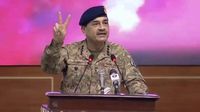In a series of dramatic statements delivered during a high-profile visit to the United States, Pakistan’s Army Chief Asim Munir issued a stark nuclear warning against India, drawing sharp international attention and sparking heated responses across the subcontinent. Munir’s remarks, made at a black-tie dinner in Tampa, Florida, have been described by The Print as the first time a foreign military leader has openly threatened nuclear retaliation against another country from American soil. The timing and content of these statements have sent ripples through diplomatic and military circles, raising concerns about the stability of South Asia and the future of one of the world’s most volatile rivalries.
Munir’s visit to Washington on August 10, 2025, was his second since the brief but intense four-day conflict with India earlier in the year. The official agenda included attending the retirement ceremony of outgoing US Central Command (CENTCOM) Commander General Michael E. Kurilla and the assumption of command by Admiral Brad Cooper. Yet, it was Munir’s off-script comments at a dinner hosted by Pakistani honorary consul Adnan Asad at the Grand Hyatt Hotel that captured global headlines.
According to The Print and corroborated by PTI, Munir warned, “We are a nuclear nation. If we think we are going down, we’ll take half the world down with us.” This chilling declaration was delivered before an audience of around 120 members of the Pakistani diaspora, with strict prohibitions on mobile phones and digital devices to maintain secrecy. The event, which also saw attendance from a representative of the Israeli defense forces, began with a recitation from the Quran and the playing of Pakistan’s national anthem, underscoring the gravity of the occasion.
The context for Munir’s threats centered on the escalating dispute over the Indus Waters Treaty. India’s recent move to suspend the treaty following the April 22 Pahalgam terror attack—an incident that left 26 dead—has been a flashpoint in Indo-Pakistani relations. Munir linked the treaty’s suspension directly to the risk of mass starvation in Pakistan, warning that “India’s move to place it in abeyance could leave 250 million people at risk of starvation.” He went further, threatening, “We will wait for India to build a dam, and when it does, we will destroy it with 10 missiles.” He added pointedly, “The Indus river is not the Indians’ family property. We have no shortage of missiles, Praise be to God.”
Munir’s speech was laced with metaphors and analogies, painting a picture of Pakistan as a dump truck full of gravel and India as a luxury Mercedes—a vivid illustration of his belief that a collision would be disastrous for both. He also referenced Quranic verses and Pakistan’s unique status as one of only two states founded on the basis of the Islamic profession of faith, claiming divine favor for his country’s future. “Allah will bless Pakistan with his bounty,” Munir asserted, “because it is one of only two states founded on the basis of the Kalimah.”
Not content to focus solely on India, Munir also took jibes at India’s diplomatic tensions with the US and boasted about Pakistan’s ability to balance rival global powers. He joked, “The real reason for our success is that we are not misers. If someone does good work, we praise and appreciate them. That is why we nominated President Donald Trump for the Nobel Prize.” This remark, while tongue-in-cheek, underscored the complex and sometimes contradictory dynamics at play in US-Pakistan relations.
Munir’s visit included official engagements with senior American political and military leaders, as well as interactive sessions with the Pakistani diaspora. He met with General Dan Caine, Chairman of the Joint Chiefs of Staff, and extended an invitation for Caine to visit Pakistan. During his stay, Munir also lauded General Kurilla’s leadership and expressed confidence in Admiral Cooper’s ability to continue fostering bilateral military cooperation. According to an official statement quoted by PTI, Munir urged the diaspora to remain confident in Pakistan’s bright future and to actively contribute to attracting investments for the country’s progress.
The fallout from Munir’s statements was immediate and fierce, particularly from Indian political and military leaders. Shiv Sena MP Priyanka Chaturvedi described the threats as “cowardly” and called for international intervention, stating, “These are all cowardly threats coming from a failed nation and a failed marshal. It becomes imperative that the IAEA steps in and takes control of their nuclear weapons because they are in the control of an absolutely maniacal person who is threatening India from the soil of America.”
BJP leader Gourav Vallabh echoed these sentiments, branding Munir “the face of terrorism” and urging the IMF to reconsider financial aid to Pakistan. “As an Indian, I want to tell Asim Munir that this is New India—here, a bullet is answered with a shell. This New India adopts a firm policy against terrorism,” Vallabh declared, emphasizing India’s readiness to respond to any provocation.
Congress leader Imran Masood criticized India’s decision to halt military advances, suggesting that had India pressed further, “Asim Munir wouldn’t have the courage to say such things.” Indian military officials, including retired Major General PK Sehgal, dismissed Munir’s nuclear threats as bluster, warning that any use of nuclear weapons would spell “physical suicide” for Pakistan. “If Pakistan, even by mistake, uses nuclear weapons, it will be a catastrophe for all continents, but for Pakistan, it will be physical suicide. Pakistan’s very existence will be wiped out,” Sehgal asserted.
Even as Munir’s statements drew condemnation, some Indian officials chose to mock Pakistan’s attempts at narrative management. Chief of Army Staff General Upendra Dwivedi ridiculed Munir’s recent promotion to Field Marshal, quipping, “If you ask a Pakistani whether you lost or won, he will say my chief has become a field marshal, so we must have won only.” Former diplomat Rajiv Dogra pointedly remarked that water from the Indus River is indeed India’s “family property,” and suggested Munir “should consult an intelligent person before saying anything.”
Munir’s remarks also highlighted the ongoing information war between India and Pakistan, with Indian officials crediting social media campaigns like ‘Justice done: Op Sindoor’ for shaping public perception in the aftermath of the conflict. India’s Ministry of External Affairs, meanwhile, recalled Pakistan’s history of declaring victory despite unfavorable outcomes, drawing parallels to past conflicts in 1971, 1975, and the 1999 Kargil War.
Beyond the rhetoric, Munir’s visit marked a continuation of Pakistan’s efforts to bolster its international standing and military partnerships. In June 2025, he attended a private luncheon with former US President Donald Trump, an unusual honor for a foreign military leader, which resulted in announcements of enhanced US-Pakistan cooperation, including a new oil deal. These developments reflect the intricate web of alliances and rivalries that define South Asian geopolitics, where military posturing and diplomatic maneuvering often go hand in hand.
Munir’s nuclear threats, delivered from US soil, have not only escalated tensions with India but also raised questions about the role of military leaders in shaping national policy and the risks of brinkmanship in a nuclear-armed region. As both countries brace for the next chapter in their long-standing rivalry, the world watches closely, hoping that cooler heads will prevail over the rhetoric of destruction.



